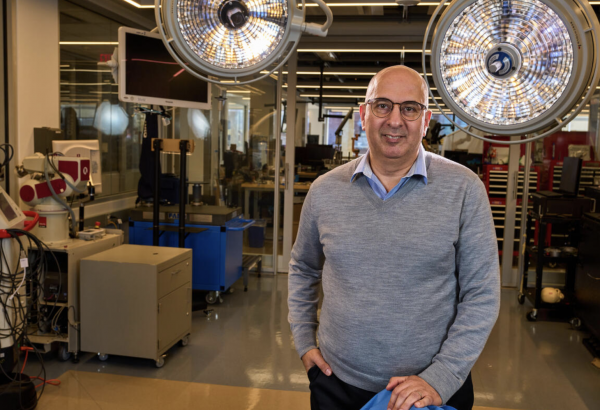A multidisciplinary team from the Vanderbilt Institute for Surgery and Engineering has received a multi-year, multi-million dollar contract to develop a low-cost simulation tool to train medical personnel in Kenya to perform minimally invasive laparoscopic procedures.
The project will be led by Nabil Simaan, professor of mechanical engineering and a globally renowned expert in robotic surgery. It is part of Wellcome Leap’s “Surgery: Assess/Validate/Expand” (SAVE) initiative that awarded similar grants to 13 teams from leading academic institutions and corporations. The goal is to find solutions that allow safer, minimally invasive surgeries for a wider swath of the global population.

“The leading causes of surgical-related deaths in Africa are due to wound-site infections, sepsis, hemorrhage and anesthesia complications,” Simaan said. “Expanding the availability of minimally invasive, low-cost procedures such as laparoscopy can go a long way toward addressing these challenges.”
Provost and Vice Chancellor of Academic Affairs C. Cybele Raver praised the project as one exemplifying the power of approaching solutions from a multidisciplinary perspective.
“Our interdisciplinary Vanderbilt team brings some of the most sophisticated robotic technology in the world to address a pressing global need,” Raver said. “A project like this lies at the very heart of Discovery Vanderbilt and the university’s research mission. I greatly value the vision and support that Wellcome Leap is providing to support our collaboration with global partners in designing and implementing innovative solutions.”
The simulation environment proposed by Simaan and his VISE colleagues—as well as members of the Vanderbilt University Medical Center’s Institute for Global Health—draws on augmented reality, machine learning, soft-tissue modeling, eye-tracking technology and assistive (haptic) force feedback to make training more effective for new users. The system will also be able to mimic the pressure needed for making incisions in soft tissue and to replicate organ shapes and common deformities.
“The founding vision of VISE was to bring Vanderbilt health care and engineering experts together to develop unique solutions aimed at enhancing human health,” said Benoit Dawant, director of VISE and Cornelius Vanderbilt Professor of Engineering. “This award from Wellcome Leap lends resounding validation to that initial concept. I hope—and truly believe—this award marks the beginning of an even more productive and innovative era for VISE.”
In Kenya, 13 percent of health care workers are classified as clinical officers, or COs, who are authorized to perform limited procedures, but not surgery. They also have not received full medical training. Only 7 percent of the health care population are medical officers, or MOs, the equivalent of Western physicians who have received full training and are allowed to perform surgeries.
“Currently, Kenya has only 332 qualified surgeons in the country—that’s about one for every 162,000 people. By comparison, there are around 55 qualified surgeons for every 100,000 people in the U.S.,” Simaan said.
The long-term vision of this research, he added, is to accelerate skill training and assessment for medical personnel in developing countries where the traditional model of apprenticeship is difficult because of the low number of surgical experts who can serve as mentors. The project will test the feasibility of using simulators to teach surgical skills, expanding the number of health care professionals equipped to perform minimally invasive emergency procedures such as cholecystectomy, appendectomy and peptic ulcer repair.
The first three years of the grant, he said, would be spent developing the simulation tools and training an initial cohort of medical personnel.
Colleagues on this project include:
- Dr. Jason Axt, surgeon and site director of the International Residency Training Organization at AIC Kijabe Hospital, Kenya
- Dr. Jack Basara, surgeon and urologist, AIC Kijabe Hospital, Kenya
- Mary Dietrich, professor of statistics and measurement
- Dr. Kamran Idrees, chief of the division of surgical oncology and endocrine surgery and associate professor of surgery
- Dr. Rondi M. Kauffmann, associate professor of surgery
- Soheil Kolouri, assistant professor of computer science
- Michael Miga, Harvie Branscomb Professor and professor of biomedical engineering
- Jie Ying Wu, assistant professor of computer science
About RDS
The grant proposal was supported by Research Development and Support (RDS), which offers proposal development assistance for both private (foundations) and federally funded opportunities. Services include searches for new sponsors, coordination and team building for proposals of any size, content development, and draft review. RDS further supports faculty by building relationships with external sponsors, hosting workshops, and providing guides and language for common proposal requirements. RDS is in the Office of the Vice Provost for Research and Innovation. To learn more about RDS or request services, contact us at rds@vanderbilt.edu.
